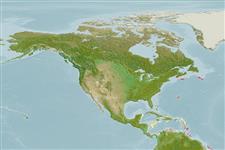>
Anguilliformes (Eels and morays) >
Nettastomatidae (Duckbill eels)
Etymology: Nettenchelys: Greek, netta = duck + Greek, enchelys, -yos = eel (Ref. 45335); inion: From the Greek word inion meaning back of head, occiput, referring to the position of the posterior nostril. Noun in apposition.
Environment: milieu / climate zone / depth range / distribution range
ນິເວດວິທະຍາ
ສັດທະເລ ກ່ຽວກັບ(ຢູ່)ຊັ້ນນ້ຳໃນທະເລທີ່ເໜີອພື້ນດິນ; ລະດັບຄວາມເລິກ 458 - 531 m (Ref. 40819). Deep-water
Western Central Atlantic: Bahamas.
ຂະໜາດ / ນ້ຳໜັກ / Age
Maturity: Lm ? range ? - ? cm
Max length : 42.3 cm TL ຕົວຜູ້/ບໍ່ມີເພດ; (Ref. 40819)
ສັດທີ່ມີກະດູກສັນຫຼັງ: 210. Posterior nostril at occiput, just in front of supratemporal canal. Median supratemporal pore present. Anterior vomerine teeth not enlarged. Predorsal 37% preanal, head 38% preanal.
Life cycle and mating behavior
ການຈະເລີນເຕັມໄວ | ການສືບພັນ | ການວາງໄຂ່ | ໄຂ່ | ຄວາມດົກຂອງໄຂ່ປາ | ຕົວອ່ອນ
Smith, D.G., J.E. Böhlke and P.H.J. Castle, 1981. A revision of the nettastomatid eel genera Nettastoma and Nettenchelys (Pisces: Anguilliformes), with descriptions of six new species. Proc. Biol. Soc. Wash. 94(2):535-560. (Ref. 40819)
IUCN Red List Status (Ref. 130435: Version 2024-2)
Threat to humans
Harmless
Human uses
ເຄື່ອງມື
Special reports
Download XML
ແຫຼ່ງອີນເຕີເນັດ
Estimates based on models
Preferred temperature (Ref.
123201): 8.3 - 9, mean 8.5 °C (based on 7 cells).
Phylogenetic diversity index (Ref.
82804): PD
50 = 0.5039 [Uniqueness, from 0.5 = low to 2.0 = high].
Bayesian length-weight: a=0.00089 (0.00036 - 0.00222), b=2.98 (2.76 - 3.20), in cm total length, based on LWR estimates for this (Sub)family-body shape (Ref.
93245).
ຊັ້ນເຂດຮ້ອນ (Ref.
69278): 3.4 ±0.5 se; based on size and trophs of closest relatives
ຄວາມຢືດຢຸ່ນ (Ref.
120179): ຕຳ່, ປະຊາກອນຕຳ່ສຸດທີ່ໃຊ້ເວລາສອງເທົ່າ 4.5 - 14 ປີ (Assuming tmax>10).
Fishing Vulnerability (Ref.
59153): Low to moderate vulnerability (32 of 100).
